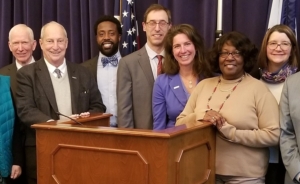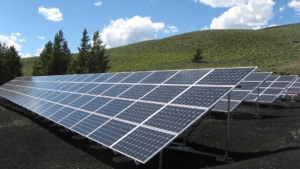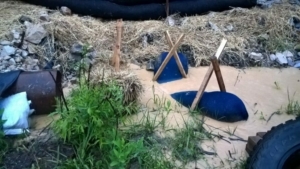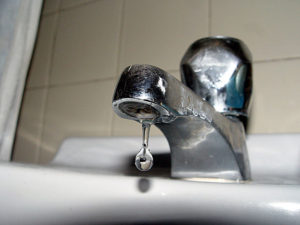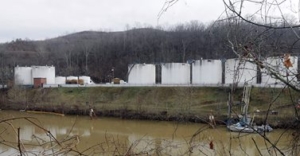3 Weeks Left in 2020 Legislative Session – Lawmakers Need to Hear from You
It’s hard to believe that the 2020 West Virginia Legislative session has passed the halfway mark. Already citizen advocates have contacted members of the WV legislature 25,830 times in support of clean water!
We’re seeing the results of your efforts pay-off. A few bills that support a healthy environment and clean water are making their way through the legislature. But there is still a lot of work to do!
Take a meaningful action for clean water today by completing our easy action of the week!
Easy Action for Clean Water
Each week of the legislative session, we share an easy action for clean water, it only takes a few minutes and it is the most urgent call to action.
Easy Action: Contact members of the Senate Judiciary Committee and ask them to support SB 679, The Clean Drinking Water Act of 2020
Want to receive the Easy Action of the Week delivered to your email inbox each week of the legislative session? Sign-up for our policy news here.
Tracking Water Policy: Legislature Considers Proactive Water Bills
Clean Drinking Water Act of 2020 – HB 4542/SB 679
There are a number of bills this session that benefit water. Leading the “good bill” pack is the Clean Drinking Water Act of 2020 HB4542/SB679. This bill proactively addresses a category of manmade chemical toxins called polyfluoroalkyl substances, or “PFAS”.
These nasty chemicals are known to cause cancer and other adverse health effects and exposure is often through drinking water. Currently, they are largely unregulated at the Federal level and the USEPA is greenlighting the use of even more PFAS in manufacturing.
That’s why it’s up to states to make sure our health is protected now. The Clean Drinking Water Act works to identify sources of PFAS contamination and sets safe limits on their existence in water. Learn more and watch a recent press conference on the Act here.
Advocates joined together for a press conference on the Clean Drinking Water Act of 2020. Watch it here.
Status: Versions of the bill have been introduced in both chambers and it appears the Senate Judiciary Committee may be the first to take up the Act. Members of the Senate Judiciary need to hear from you – please ask them to support the Clean Drinking Water Act of 2020 here.
Creation of Just Transition Office – HB 4574
As the coal industry continues to decline it’s important for communities in West Virginia to receive resources to help them adapt to the changing economy. HB 4574, would create the Just Transition Office to help communities rebuild their economies and diversify their economic base.
Status: Passed the House Small Business, Entrepreneurship and Economic Development Committee and is in the House Government Organization Committee.
Creating a Program to Further Develop Renewable Energy Resources – SB 583
A bill, SB 583, that would allow West Virginia utility companies to create solar energy projects and use that energy passed the West Virginia Senate. Relying on more solar-based energy helps reduce greenhouse gas emissions, which cause climate impacts affecting our river ecosystems. Read an article in the Beckley Register-Herald on the bill here.
Status: Passed the Senate unanimously on 2/14. It now will be reported to the House where it will be referred to a committee.
Increasing Penalties for Water Quality Violations – HB 4787
We’re seeing multi-billion dollar pipeline projects repeatedly violate their permits, resulting in harm to waterbodies across the state with relatively minimal monetary consequences. HB 4787 was introduced just this week to help address the problem. This legislation takes steps to deter polluters from breaking the law by allowing the WVDEP to increase penalties for water quality violations.
Status: In the House Agriculture and Natural Resources Committee.
Improving Dissemination of Boiled Water Advisories to Affected Communities – HB 3049
When drinking water is unsafe the public needs to know quickly. This bill requires water utilities to make customers aware of boiled water advisories through a text and voice alert system.
Status: Passed the House and is in Senate Health and Human Resources.
Recommendations of the Public Water System Supply Study Commission
We support the implementation of recommendations of the WV Public Water System Supply Study Commission (PWSSSC), which was formed in response to the 2014 WV Water Crisis.
Last week, 2/7, WV Rivers participated in a stakeholder meeting hosted by a subcommittee of the Senate Energy, Industry and Mining Committee on the PWSSSC recommendations. The draft legislation under consideration would require public water systems to receive notice of violations from polluters upstream of their intakes.
There were objections to the proposed recommended requirement voiced by the coal and natural gas industries. We will keep working with water utilities and legislators to make sure our drinking water providers have the information they need to manage contamination threats.
Status: Senate Energy, Industry and Mining subcommittee recommended it be referred to an interim study commission.
Protecting the State’s Waters from Coal Company Bankruptcies – HB 4816
As more coal companies declare bankruptcy, our rivers and streams impacted by mining are at great risk for being left without the clean-up they deserve. HB 4816 takes an important step of eliminating self-bonding by coal companies.
Status: In House Energy Committee.
Bill Would Rollback Regulations of Oil & Gas Tanks Near Drinking Water Intakes
The session kicked off with the introduction of a bill that would exempt oil and gas storage tanks from the Aboveground Storage Tank Act.
The bill, HB 4079, is particularly alarming because it deregulates tanks that are located within zones of critical concern (ZCCs), or the areas directly upstream from public drinking water intakes.
Right now, there are about 620 oil & gas storage tanks within ZCCs that would be exempted by HB 4079. Of those 620 storage tanks, 153 are deemed “Not Fit for Service”, meaning the tanks have not met basic standards and pose a very serious risk to drinking water supplies. HB 4079 would deregulate these tanks, putting our drinking water at a greater risk for contamination. You can hear WV Rivers’ executive director discuss HB 4079 during a recent episode of WV Public Broadcasting’s “The Legislature Today” here.
The legislature has heard loud and clear that West Virginians oppose this bill. Over 900 people have contacted members of the House Energy Committee opposing the bill and so far it hasn’t been added to the committee’s agenda. We’re tracking the bill closely and will let you know if the committee puts HB 4079 on the agenda.
Federal Policy Update: Clean Water Act, Coal-Fired Power Plant Rules and New River National Park & Preserve
While it may seem like our sole focus is on state policy this time of year, we are keeping a close eye on federal policies that affect our water.
Collins Run. Photo by Kent Mason.
Changes to Headwater Stream Protections
In late January, the Environmental Protection Agency (EPA) and the Army Corps of Engineers finalized the Navigable Waters Protection Rule which re-defines “waters of the United States” under the Clean Water Act. In Fall of 2019, we submitted comments on the proposed rule change and you can read our comments here. Were you one of the 492 people that submitted comments on the rule through our action alert?
EPA’s new definition eliminates protections for rain-dependent headwater streams and isolated wetlands. That means more than half our nation’s wetlands and millions of miles of streams are no longer protected by the Clean Water Act. The Navigable Waters Protection Rule will become effective 60 after publication in the Federal Register. The West Virginia Department of Environmental Protection is still discussing how they will respond to the new Rule. We are following this issue closely to ensure our headwater streams and wetlands are protected!
EPA Proposes to Weaken Coal-Fired Power Plant Rules
The EPA is proposing to weaken two rules that regulate coal fired power plants, the Effluent Limitation Guidelines (ELG) and the Coal Combustion Residuals (CCR) Rule. WV Rivers recently submitted comments to EPA opposing these revisions. EPA’s revised rules could weaken regulations for six coal-fired power plants in West Virginia.
Coal-fired power plants are responsible for the majority of toxic metals released into our rivers and streams including arsenic, lead, mercury, and selenium. Rather than requiring power plants to use proven technologies to reduces toxic pollutants in our rivers and groundwater, EPA is planning to gut existing regulations that endangers human health and aquatic life. Learn more and read our comments on these rules here.
Public Hearing on New River Park and Preserve – Beckley, 2/22
Sandstone Falls on the New River.
Next Saturday, 2/22, the Senate committee considering a bill to change the federal designation for the New River National River will hold a public hearing in Beckley. The legislation, supported by Senators Manchin and Capito, would change the designation for the New River from a National River to a National Park and Preserve. The Park and Preserve designation allows for hunting, foraging, camping and private boating within the park boundaries. You can learn more about the proposal here.
What: Public Hearing on New River National Park and Preserve
When: February 22, 2020; 9:30AM
Where: Tamarack Conference Center, 1 Tamarack Park, Beckley, West Virginia.
WV Rivers in the News
Dem. Lawmakers Advocate For Regulation And Research Of Water Contaminating Chemicals
Six years since the Freedom Industries spill
Thirst for protecting water supplies drives WV partnership
Fighting the Fossil Fuel Economy in Appalachia
Advocates Weigh In On How To Protect Environment, Property Rights As Natural Gas Grows


